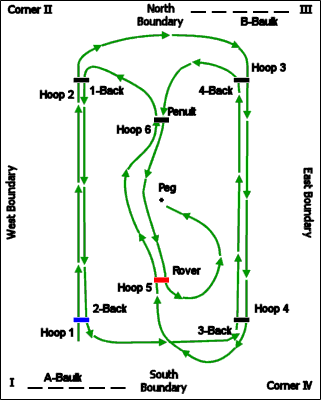This page features:
- A synopsis of the game (see below)
- A synopsis of Advanced Play
- The Laws of Association Croquet – 2008
- Official Rulings on the Laws of Association Croquet – Nov 2017
A Synopsis of the game (courtesy The Croquet Association – UK)
(May take a few moments to load)
 Association Croquet is played with four balls, (Primary colours Blue and Black versus Red and Yellow, or Secondary colours Green and Brown versus Pink and White) on a court shown to the right.
Association Croquet is played with four balls, (Primary colours Blue and Black versus Red and Yellow, or Secondary colours Green and Brown versus Pink and White) on a court shown to the right.
The game can be played as singles or doubles, each player in doubles playing with a particular ball throughout the game. Each ball must run a set course, as shown in the diagram, going through each hoop in a specific order and direction and then hitting the peg. The side which first completes this course with both its balls wins the game. Thus the winning side has 26 points to score (12 hoop points and the peg point with each ball).
A ball scores a hoop point when it passes right through a hoop in its correct order (‘runs a hoop’) in one or more strokes. The point is scored whether the ball is struck directly by the player or by another ball.
Clips coloured to match the balls are placed on the next hoop or peg to indicate the next point to be scored for each ball. The clips are placed on the crown of a hoop for the first six hoops and on the side of the hoop for the last six.
The sides start by taking alternate turns. In the first four turns, the four balls are played from one of the starting lines (‘baulk lines’) at each end of the court. There is no strict order of playing the balls. Once the four balls are on the court a side chooses which of its two balls it shall play in each turn. A turn consists initially of one stroke only, but extra strokes can be earned in two ways:
- If the player’s ball runs a hoop, the player is entitled to another stroke
- If the player’s ball hits another ball (‘makes a roquet’), the player places their own ball in contact with the other ball and then strikes their ball so that the other ball moves or shakes (‘takes croquet’). After this, the player is entitled to one further stroke.
The player may roquet and thus take croquet from each of the other three balls in succession in any turn. A ball that may be roqueted is known as a live ball, one from which croquet has been taken, dead. The striker must not attempt to take croquet from a dead ball; if they do so, their turn ends. When the striker runs a hoop in order, all balls then come alive and the player may repeat the above process. Thus, by a combination of taking croquet and running hoops, a series of points can be scored in a turn (‘making a break’).
A turn ends when the player has made all the strokes to which they are entitled, or if they send a ball off court when taking croquet, or if they make a fault as defined in the Laws. A turn does not necessarily end if a ball is sent off court in any stroke other than when taking croquet.
At the end of each stroke, any ball which has crossed the boundary line, is placed a yard inside the boundary (‘on the yard-line’) nearest to where the ball went out, and any ball lying between the boundary and the yard-line, except the player’s own ball, is also replaced on the yard-line. When a ball has scored its last hoop point (‘becomes a rover’) it can score the peg point either by the player hitting it onto the peg or by being hit onto the peg by another rover ball. The ball is thus ‘pegged-out’ and removed from the court.
The game of Association Croquet is in essence a tactical struggle with each player trying to manoeuvre both their own and their opponent’s balls to make points for their side whilst restricting their opponent’s chances of doing the same by careful positioning of the balls at the end of their turn.
